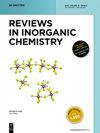Homo and heterometallic ruthenium and platinum complexes with multiple targets for therapeutic applications: a review
IF 3.1
3区 化学
Q1 CHEMISTRY, INORGANIC & NUCLEAR
引用次数: 0
Abstract
Abstract We are now well-positioned to comprehend carcinogenesis at a molecular level in greater detail due to significant technological advancements. Additionally, we are now able to rationally design and develop drug molecules with the ability to either selectively enhance or disrupt important biological processes, maximizing their therapeutic potential. This has heralded a new era in drug design. The heterometallic ruthenium–platinum complexes can be used as anticancer, photodynamic therapy, diabetes treatment, and molecular sensors for thiol-containing peptides due to their multifunctional interactions with nuclear DNA, mitochondrial DNA, RNA, and proteins. Compared to cisplatin and its Ru-based monometallic precursors, a significant number of reported ruthenium–platinum complexes exhibit enhanced cytotoxicity and tumor selectivity. Due to the covalent binding of the cis-PtIICl2 moiety to DNA, photoactive Ru(II)–Pt(II) complexes were designed to prelocalize a photodynamic therapy agent at the site of action. The development of ruthenium–platinum-based heterometallic complexes has recently advanced, opening up new avenues for the development of drugs that are more efficient. Metal complexes’ potential as important cancer therapeutic agents will be the primary focus of this review. The development of ruthenium and platinum-based mono and mixed-metal complexes with therapeutic and biomedical applications are discussed in detail in this article.具有多靶点的同源和异金属钌和铂配合物在治疗中的应用:综述
摘要由于重大的技术进步,我们现在能够更详细地理解分子水平上的致癌作用。此外,我们现在能够合理地设计和开发药物分子,使其能够选择性地增强或破坏重要的生物过程,最大限度地发挥其治疗潜力。这预示着药物设计进入了一个新时代。异金属钌-铂复合物可用于抗癌、光动力治疗、糖尿病治疗和含巯基肽的分子传感器,因为它们与核DNA、线粒体DNA、RNA和蛋白质具有多功能相互作用。与顺铂及其钌基单金属前体相比,大量报道的钌-铂络合物表现出增强的细胞毒性和肿瘤选择性。由于顺式-PtICl2部分与DNA共价结合,光活性Ru(II)–Pt(Ⅱ)复合物被设计用于在作用位点预定位光动力治疗剂。钌-铂基杂金属配合物的开发最近取得了进展,为开发更有效的药物开辟了新的途径。金属配合物作为癌症重要治疗剂的潜力将是本综述的主要焦点。本文详细讨论了具有治疗和生物医学应用的钌和铂基单金属和混合金属配合物的发展。
本文章由计算机程序翻译,如有差异,请以英文原文为准。
求助全文
约1分钟内获得全文
求助全文
来源期刊

Reviews in Inorganic Chemistry
化学-分析化学
CiteScore
7.30
自引率
4.90%
发文量
20
审稿时长
1 months
期刊介绍:
Reviews in Inorganic Chemistry (REVIC) is a quarterly, peer-reviewed journal that focuses on developments in inorganic chemistry. Technical reviews offer detailed synthesis protocols, reviews of methodology and descriptions of apparatus. Topics are treated from a synthetic, theoretical, or analytical perspective. The editors and the publisher are committed to high quality standards and rapid handling of the review and publication process. The journal publishes all aspects of solid-state, molecular and surface chemistry. Topics may be treated from a synthetic, theoretical, or analytical perspective. The editors and the publisher are commited to high quality standards and rapid handling of the review and publication process.
Topics:
-Main group chemistry-
Transition metal chemistry-
Coordination chemistry-
Organometallic chemistry-
Catalysis-
Bioinorganic chemistry-
Supramolecular chemistry-
Ionic liquids
 求助内容:
求助内容: 应助结果提醒方式:
应助结果提醒方式:


